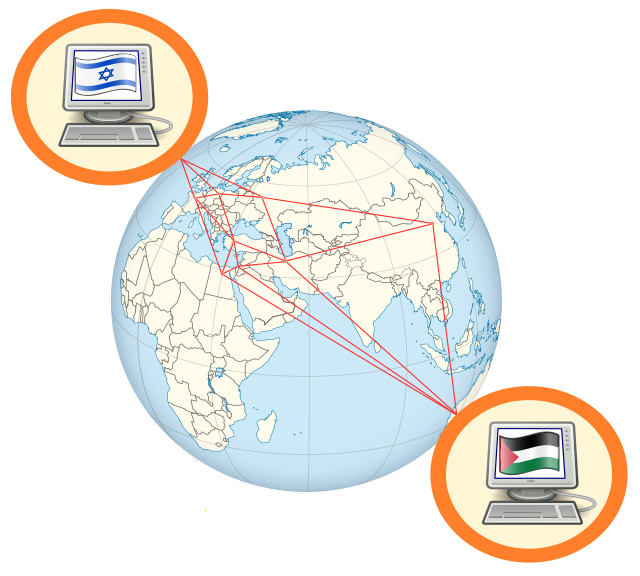The Spillover of the Gaza War into the Western World

The Internet and the War. Photo: WikiMedia
By: Arab America Contributing Writer
Introduction
In the early morning of Saturday October 7, fighters from Gaza had took control of the Beit Hanoun crossing—the only route through which Gaza residents could reach the rest of Palestine. Soon, information spread across social media that the wall Israel had built around the Gaza Strip to confine its 2.3 million people had been breached. The war in Gaza had begun.
Media Response
The conflict in Gaza is far from isolated. While it may be taking place in the Middle East, it has gotten the attention of people from all around the world. As the conflict is still going on, we cannot ignore the international response, especially through the media.
The media’s intense coverage has had a significant impact. People worldwide are taking sides, and this polarized environment extends beyond passionate debates about the conflict, into darker territories where hate crimes become a reality. Generalizations that associate all Arabs, Muslims, and Palestinians with Hamas, and the tendency to conflate anti-Semitism with anti-Zionism, reveal deep-seated prejudices that aggravate the conflict’s complexity.
Prejudice and Tragedy
Tragically, these prejudices can have devastating real-world consequences. In a horrifying incident, a 6-year-old Muslim boy, Wadea Al-Fayoume, was stabbed to death by his landlord who police say targeted him and his mother due to their Palestinian American identity. His mother, Haanan Shahin, barely survived the brutal attack, enduring multiple stab wounds.
In Dearborn, Michigan, another example of prejudice unfolded as police arrested a man for posting on Facebook that he wanted to “hunt Palestinians.” This hatred, incited online, reinforces the idea that the conflict’s repercussions extend far beyond the borders of Israel and Palestine.
Additionally, the University of California, Los Angeles, found itself involved in controversy when a group of individuals interrupted a webinar, threatening to harm Palestinian supporters by referring to them as terrorists. These incidents, both online and offline, prove the need for a broader understanding of the conflict and a commitment to unity rather than division during such challenging times.
The Right Responses
In response to these incidents, organizations and community leaders should advocate for unity. Public figures and activists should use their platforms to spread messages of peace instead of hate, encouraging dialogue, debates and protests instead of the commitment of hate crimes. Taking a side in this conflict is natural, however, discriminating against people that are not necessarily related to the conflict just because of their religious beliefs or ethnic backgrounds is never okay.
Additionally, there’s a pressing need for greater accountability when it comes to news outlets and social media accounts. The spread of biased or fake news only deepens the divide and prejudice surrounding the Israeli-Palestinian conflict. Responsible reporting, free from the preexisting agendas, is essential to ensure that the public receives an accurate and balanced portrayal of events. Holding media outlets and social platforms to high standards of objectivity can play a crucial role in reducing misinformation and promoting understanding.
Conclusion
During times of war, the world should strive to come together in pursuit of human rights and justice, transcending cultural, religious, and ethnic divisions. The recent events in Gaza serve as a reminder of the interconnectedness of our global community, emphasizing the urgency of collectively finding solutions that uphold and promote human rights.
Check out Arab America’s blog here!








